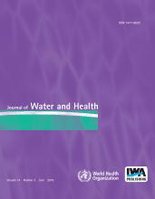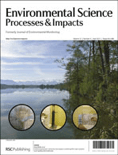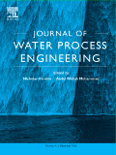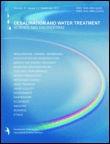
Water Quality Research Journal
Scope & Guideline
Unraveling complexities of water quality for all.
Introduction
Aims and Scopes
- Water Quality Assessment:
The journal emphasizes the evaluation of water quality through various indices and methodologies, including the Water Quality Index (WQI) and machine learning techniques. This includes studies that assess the impact of pollutants and the effectiveness of treatment processes. - Wastewater Treatment Technologies:
Research on advanced wastewater treatment methods, such as electrocoagulation, advanced oxidation processes, and biofiltration systems, is a core focus. The journal publishes innovative approaches to enhance the removal of contaminants from industrial and municipal wastewater. - Environmental Impact Studies:
The journal covers research that investigates the effects of land use, agricultural practices, and industrial activities on water quality. This includes studies on nutrient runoff, pesticide contamination, and the ecological consequences of water pollution. - Emerging Contaminants and Pollutants:
A significant area of focus is the identification and removal of emerging pollutants, such as pharmaceuticals and microplastics, from water sources. This includes research on the mechanisms of removal and the implications for public health and the environment. - Innovative Monitoring Techniques:
The journal promotes the use of novel monitoring techniques, including GIS-based approaches, fluorescence spectroscopy, and machine learning, to enhance water quality monitoring and data analysis.
Trending and Emerging
- Machine Learning and AI Applications:
There is a growing trend towards the use of machine learning and artificial intelligence in water quality monitoring and prediction. This reflects the increasing capability and interest in leveraging data science for environmental research. - Sustainable Wastewater Treatment Solutions:
Emerging themes focus on sustainable and green technologies for wastewater treatment, including the use of natural coagulants and innovative biofiltration systems, which align with global sustainability goals. - Impact of Climate Change on Water Quality:
Recent publications indicate an increasing focus on the effects of climate change on water quality, including studies on thermal pollution and the influence of hydrological changes on water ecosystems. - Health Impacts of Water Quality:
An emerging area of research involves exploring the health impacts of water quality, particularly in the context of pandemics, antibiotic resistance, and the presence of contaminants in drinking water. - Integrated Water Resource Management (IWRM):
There is a noticeable trend towards integrated approaches that consider the interconnections between water quality, supply management, and ecosystem health, reflecting a holistic view of water resource management.
Declining or Waning
- Traditional Water Quality Indices:
There has been a noticeable decrease in the publication of studies focused solely on traditional water quality indices without integrating them with modern analytical techniques or technologies. - Basic Laboratory Analysis Techniques:
Research employing basic laboratory methods for water quality analysis, such as simple chemical tests, is becoming less frequent as there is a shift toward more sophisticated and automated methods. - General Reviews of Water Quality:
While comprehensive reviews remain important, there is a trend towards more specific, data-driven analyses rather than broad overviews, indicating a declining interest in generalized literature reviews.
Similar Journals

ACS ES&T Water
Connecting researchers and policymakers for water innovation.ACS ES&T Water, published by the American Chemical Society, is a leading peer-reviewed journal focused on the interdisciplinary field of water science and technology. Since its inception in 2021, the journal has rapidly established itself as a prominent platform for research, boasting an impressive impact factor and ranking in the Q1 category across various disciplines, including Chemical Engineering, Chemistry, Environmental Chemistry, and Water Science and Technology. With a current Scopus rank of #66 out of 261 in Environmental Science and a remarkable percentile of 74%, ACS ES&T Water is dedicated to advancing the understanding of water-related challenges and solutions through high-quality research. The journal aims to facilitate communication among researchers, professionals, and policymakers by providing open access to innovative studies and methodologies that address critical issues in water resource management and sustainability. Collaborating at the intersection of chemistry and environmental science, this journal is essential for anyone invested in the future of global water security and innovation.

Journal AWWA
Championing Excellence in Water Science Research Since 1946.Journal AWWA, published by WILEY, serves as a vital platform in the fields of Chemistry and Water Science and Technology. Established in 1946 and with a rich history extending to 2024, this journal is dedicated to the dissemination of innovative research and practical insights that address the pressing challenges associated with water quality and management. Although currently not an open-access publication, it provides important contributions to a diverse audience, including researchers, industry professionals, and students dedicated to advancing knowledge in water sciences. With a respectable Q3 ranking in both the Chemistry and Water Science categories, as well as competitive Scopus rankings, Journal AWWA consistently delivers peer-reviewed articles that foster critical discussions and promote sustainable solutions within the community. The journal's commitment to excellence ensures that it remains a significant resource for those engaged in environmental science and technology.

WATER RESOURCES MANAGEMENT
Bridging Theory and Practice in Water Resource EngineeringWATER RESOURCES MANAGEMENT is a prestigious journal published by SPRINGER, renowned for its contribution to the fields of Civil and Structural Engineering as well as Water Science and Technology. Operating since 1987, this journal has established itself as a vital resource for researchers, professionals, and students alike, boasting a remarkable impact factor and a Q1 designation in both relevant categories as of 2023. The journal is indexed in Scopus, achieving commendable ranks—34th in Environmental Science and 62nd in Civil and Structural Engineering, placing it in the top percentiles of its fields. Although it does not offer open access, WATER RESOURCES MANAGEMENT serves as a comprehensive platform for disseminating innovative research, discussions, and case studies that address the global challenges of water resource management. With a commitment to fostering knowledge and advancing the understanding of integrated water management solutions, this journal is indispensable for anyone engaged in these critical scientific domains.

JOURNAL OF WATER AND HEALTH
Transforming water insights into impactful health solutions.The JOURNAL OF WATER AND HEALTH, published by IWA PUBLISHING, serves as a leading platform for disseminating innovative research related to water quality, sanitation, and public health. With its ISSN 1477-8920 and E-ISSN 1996-7829, this esteemed journal significantly contributes to the fields of Public Health, Environmental Science, and Microbiology, as evidenced by its robust rankings in several quartiles, including Q2 in Public Health and Water Science and Technology in 2023. This periodical enjoys a convergence of years from 2003 to 2024, underscoring its continuous relevance in addressing critical global issues such as water safety and infectious diseases. Although not an open-access journal, the insights and findings presented are pivotal for researchers, professionals, and students eager to contribute to the sustainable management of water resources and health improvements worldwide.

Environmental Science-Processes & Impacts
Unveiling the complexities of environmental interactions.Environmental Science-Processes & Impacts is a premier journal published by the Royal Society of Chemistry, focusing on critical research in the field of environmental science. With ISSN 2050-7887 and E-ISSN 2050-7895, this journal has established itself as an authoritative source of knowledge since its inception in 2012, maintaining a remarkable Q1 quartile ranking across significant categories such as Environmental Chemistry, Management, Monitoring, Policy and Law, Medicine, and Public Health for the year 2023. It stands as an essential resource for professionals, researchers, and students, aimed at advancing scientific understanding and solutions to pressing environmental issues. With impressive ranks in Scopus, including #45 in Public Health and #27 in Environmental Chemistry, the journal provides a platform for impactful research and interdisciplinary collaboration, emphasizing open access to foster the dissemination of knowledge globally. Join a community committed to exploring the interconnectedness of environmental processes and their implications for society by contributing to or learning from cutting-edge studies published in this esteemed journal.

Journal of Water Process Engineering
Elevating Knowledge in Water Science for Global ImpactJournal of Water Process Engineering, published by Elsevier, stands as a leading authority in the interdisciplinary fields of Biotechnology, Process Chemistry and Technology, and Water Science and Technology. With its ISSN 2214-7144, this journal has established itself since its inception in 2014, reaching its convergence year in 2024. Renowned for its high-impact contributions, it holds a prestigious Q1 ranking in 2023 across multiple categories, including Safety, Risk, Reliability and Quality and Waste Management and Disposal. The journal aims to advance knowledge and practice in water processing, addressing global challenges related to water scarcity, environmental safety, and sustainable technology. While the journal does not currently offer open access options, it remains a vital resource for researchers, professionals, and students dedicated to advancing water process engineering and management practices. By disseminating innovative research and methodologies, the Journal of Water Process Engineering plays a crucial role in shaping future technologies and strategies essential for water sustainability.

Desalination and Water Treatment
Catalyzing Change in Water Resource ManagementDesalination and Water Treatment is a pivotal journal in the realm of water science and technology, focusing on the critical issues surrounding water desalination and treatment processes. Published by DESALINATION PUBL in the United States, this journal, with ISSN 1944-3994 and E-ISSN 1944-3986, serves as an essential resource for researchers, professionals, and students engaged in ocean engineering, pollution control, and innovative water management strategies. With a transitional coverage from 2009 to 2024, it holds a respectable position in the third quartile of various categories, including Ocean Engineering, Pollution, and Water Science and Technology, as of 2023. The journal is indexed in Scopus, reflecting its contribution to the field by ranking within the 39th to 45th percentile across relevant subject areas. Although not an open-access publication, it remains a crucial platform for disseminating influential research, thereby enhancing the global repository of knowledge on water treatment methodologies and sustainable practices in desalination.

Water Research X
Pioneering research for a water-secure future.Water Research X is a prestigious journal published by ELSEVIER, focusing on the dynamic fields of water science and technology, pollution, ecological modeling, and waste management. Since its inception in 2018, this Open Access journal has become a cornerstone resource for researchers and professionals dedicated to advancing our understanding and management of water resources. Based in the United Kingdom, Water Research X holds an impressive ranking within the Scopus metrics, positioned in the Q1 category across multiple relevant disciplines, including Environmental Science, with a notable rank of 10/261 in Water Science and Technology and 3/41 in Ecological Modeling. This reflects its commitment to disseminating high-quality research that informs policy, supports sustainable practices, and fosters innovation in water management.

Hydrologie und Wasserbewirtschaftung
Championing research for responsible water stewardship.Hydrologie und Wasserbewirtschaftung, published by the BUNDESANSTALT GEWASSERKUNDE-BFG, stands as a vital open access journal in the field of hydrology and water management since its inception in 1999. Based in Germany, this journal aims to disseminate high-quality research related to water resources, environmental sustainability, and innovative management strategies. Though it has a Q4 ranking in Water Science and Technology for 2023, and holds a Scopus rank of 113 out of 225, the journal provides an essential platform for researchers, professionals, and students interested in advancing their understanding of water science. With coverage spanning from 1999 to 2018 and a seamless move to an open access model, Hydrologie und Wasserbewirtschaftung remains committed to contributing to the ongoing dialogue around critical water issues. Researchers looking to publish their findings or stay abreast of developments in water science will find this journal indispensable.

Water Practice and Technology
Advancing Knowledge for Global Water ChallengesWater Practice and Technology is a distinguished open-access journal published by IWA PUBLISHING, dedicated to disseminating cutting-edge research and practical insights within the field of water science and technology. With an E-ISSN of 1751-231X, the journal has been at the forefront of sharing knowledge since its inception in 2011 and has transitioned to open access in 2021, providing unrestricted access to high-quality research articles. Based in the United Kingdom, this journal plays a vital role in advancing the understanding of water resource management, treatment technologies, and environmental sustainability. As of 2023, it is categorized in the Q3 quartile for Water Science and Technology with a Scopus rank of #157/261, placing it in the 40th percentile among its peers. Researchers, professionals, and students alike will find the journal a valuable resource for the latest trends, innovations, and practical applications in the water sector, facilitating a collaborative approach towards addressing global water challenges.